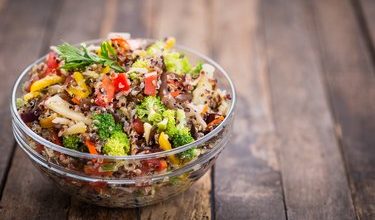Potatoes Can Help You Lose Weight — Unless You’re Making These 4 Mistakes

fcafotodigital/E+/GettyImages
When it comes to the health pros and cons of specific foods, there can be a lot of controversy. In some cases, like with eggs and cholesterol, the confusion and eventual change in perception was a matter of advances in nutrition research, which has allowed us to adapt our eating guidelines.
In other cases, though — like with potatoes and weight loss — it’s simply a matter of misinformation.
Video of the Day
Video of the Day
Why We Love Potatoes
Why do potatoes get a bad rap? They’re often chastised for their carb content when, in fact, potatoes are actually a nutrient-dense complex carbohydrate.
A medium-sized potato has just 110 calories and 26 grams of carbs, but it also provides 30 percent of your daily value of vitamin C, 15 percent of your potassium and 10 percent of your vitamin B6, according to Potatoes USA.
The Science on Potatoes and Weight
When it comes to weight loss, potatoes have been vilified, and for no good reason. There’s no compelling evidence that, when prepared in a healthy way, potatoes hamper your weight-loss goals. And there are some studies that show the opposite.
A 2014 study published in the Journal of the American College of Nutrition compared weight loss in a group of people following a reduced-calorie diet with or without potatoes and found that the potato did not cause weight gain — in fact, the people who ate potatoes daily were still able to lose weight.
Related Reading
Are Red Potatoes Healthier Than White Potatoes?
A more recent paper, published in the American Journal of Clinical Nutrition in August 2016, included a systematic review of 13 different studies on the effect potatoes have on weight as well as some chronic diseases. The researchers determined that there’s not enough evidence to suggest that eating potatoes leads to weight gain.
What they found is that french fries, specifically, may be associated with increased risks of obesity along with type 2 diabetes, highlighting that when it comes to managing our weight and health, the way in which we eat potatoes matters greatly.
What does this all mean? Potatoes can be part of a healthy weight-loss diet, as long as you’re approaching them the right way. Here are four mistakes to avoid when it comes to enjoying potatoes on your weight-loss journey.
Tip
While potatoes can be part of a healthy diet, how you prepare them makes a big difference in how they affect your weight-loss efforts.
4 Common Potato-Prep Mistakes That Can Keep You From Losing Weight
1. You’re Prepping Them in Unhealthy Ways
As the American Journal of Clinical Nutrition stated, french fries are not as neutral on weight gain and type 2 diabetes as regular potatoes. That’s because french fries are deep-fried and barely resemble the whole food they once were.
A medium serving of popular fast-food french fries has about 380 calories, 18 grams of fat (regular potatoes are fat-free), 221 milligrams of sodium and 50 grams of carbohydrates. Breakfast hash browns are typically not prepared in a healthy way, either.
The fix: Keep your potatoes away from the fryer and unhealthy oils. Instead, opt for baked, mashed or oven-roasted potatoes.
Another thing to keep in mind is how you top your whole baked potato. Topping it with loads of cheese, bacon and sour cream isn’t doing your weight any favors. Instead, try our Chili Twice-Baked Potato recipe, which calls for a load of veggies, heart-healthy olive oil and low-fat cheddar cheese.
2. You’re Not Using Them to Replace Refined Grains
Researchers in a study published January 2020 in the British Journal of Nutrition had subjects eat either one potato-based side dish or one refined grain-based side dish (think: white pasta or rice) daily, for four weeks. They ate this side dish in place of other commonly consumed carbohydrates.
It turns out, those who ate potatoes instead of refined grains had a better overall diet score, which included consuming more fiber — a nutrient strongly linked to weight loss, according to Harvard Health Publishing.
Related Reading
Why Fiber Is the Real Weight-Loss MVP — and How to Get More
The fix: When it comes to adding potatoes to your diet, consider refined carbohydrates you consume that could be replaced. Some examples include: white bread or crackers, pizza, regular pasta (not whole-wheat or legume-based) and most baked goods.
3. You’re Not Practicing Portion Control
Even though the plain potato makes a healthy addition to your diet, if you eat more calories than your body needs, you’ll gain weight. When trying to lose weight on a reduced-calorie diet, you need to take all foods consumed into consideration when tracking your calorie intake and stick to appropriate portion sizes.
The fix: According to the 2015-2020 Dietary Guidelines for Americans, we should be eating four to eight servings of starchy vegetables (potatoes, corn, green peas, lima beans, etc) a week, and a serving of potatoes is one medium potato.
4. You’re Not Eating the Skin
A medium potato with the skin provides 7 percent of your fiber needs for the day. Every bit helps when you consider only 10 percent of us get enough on a daily basis, according to a February 2017 study in the American Journal of Lifestyle Medicine. And, as noted above, fiber is an important nutrient for weight loss.
The fix: This one’s easy: Keep the skin on when prepping your baked, mashed or oven-roasted potatoes. Just make sure to scrub your spuds thoroughly first, to remove any dirt, bugs or other debris.




